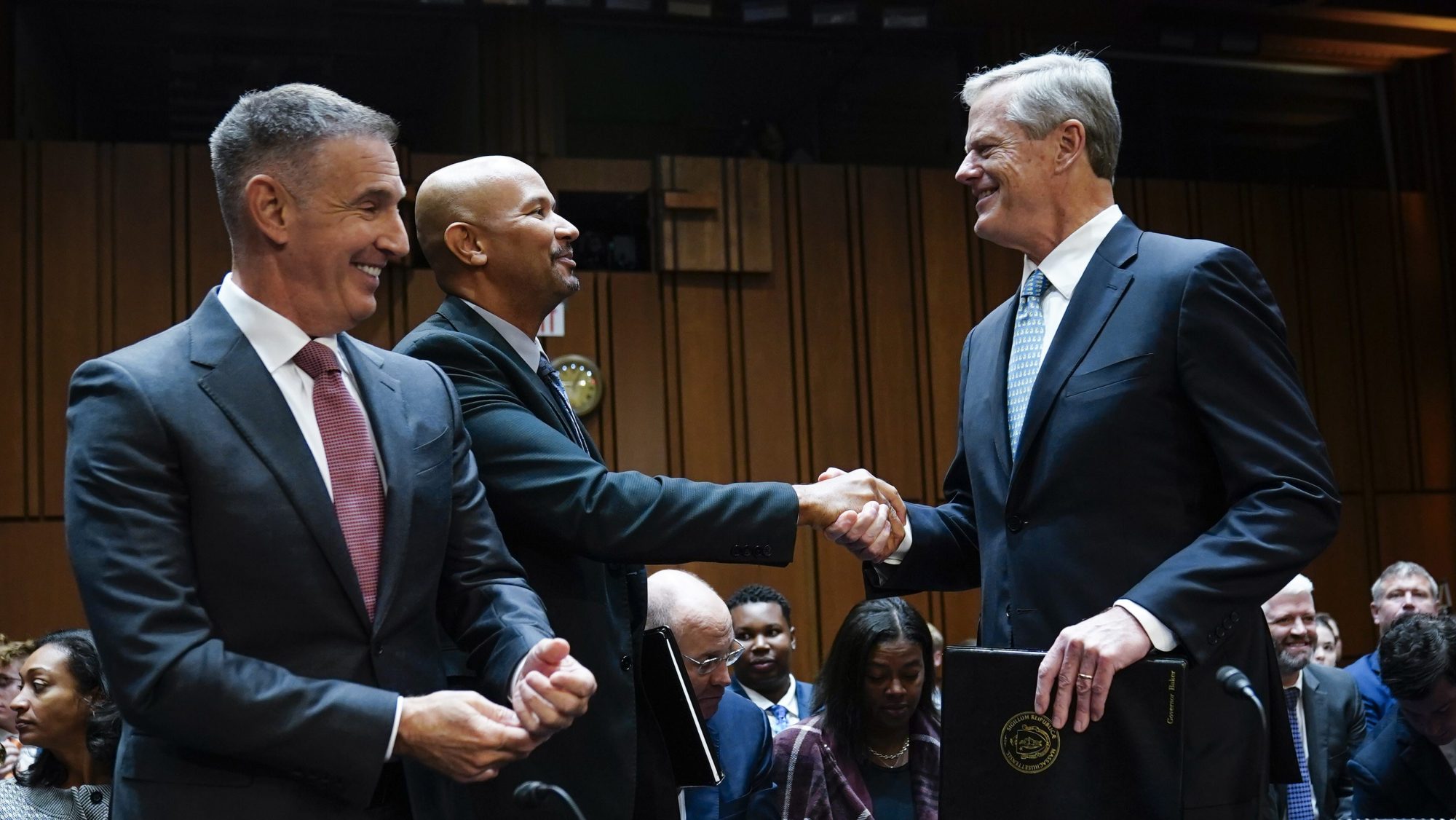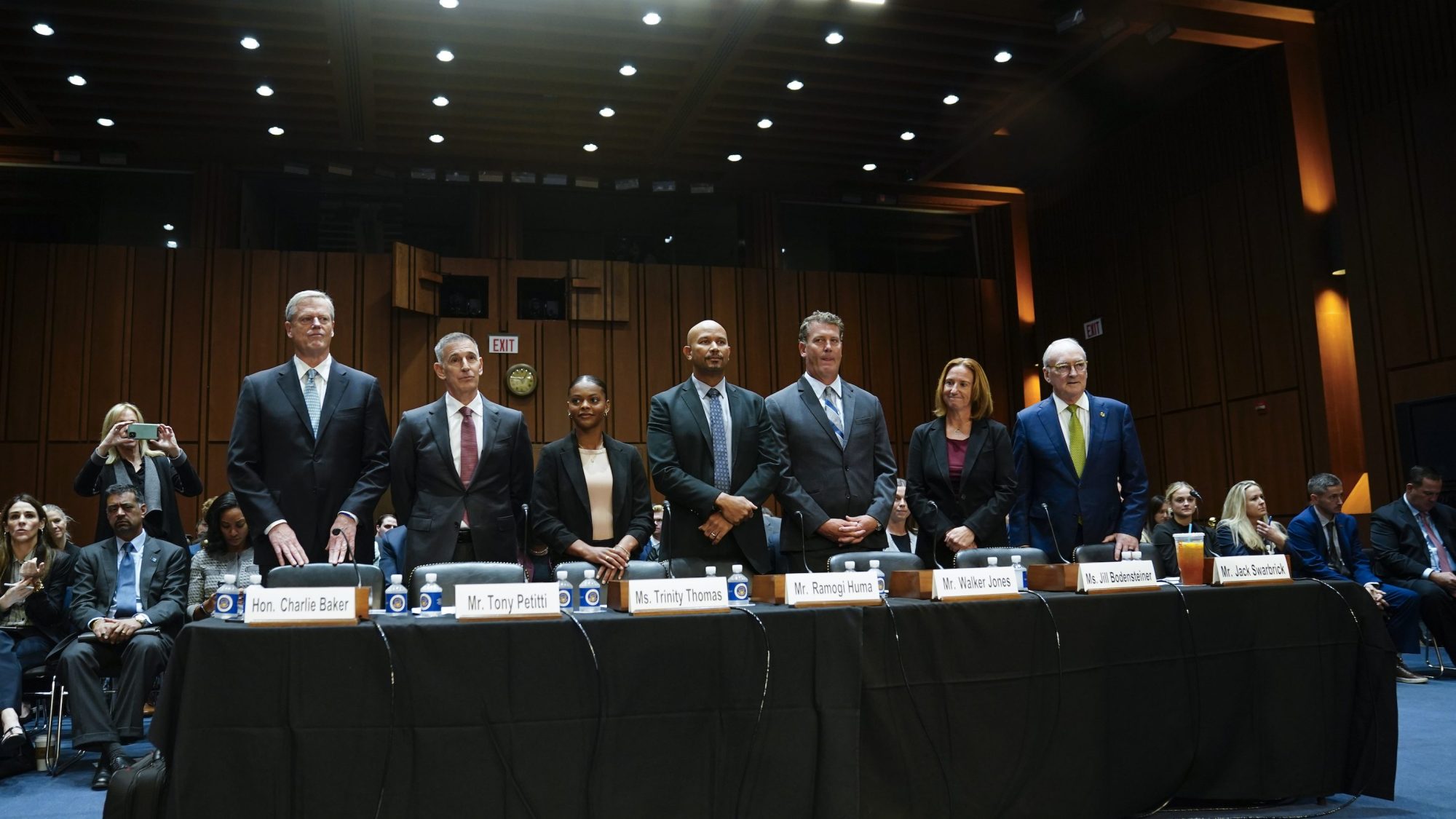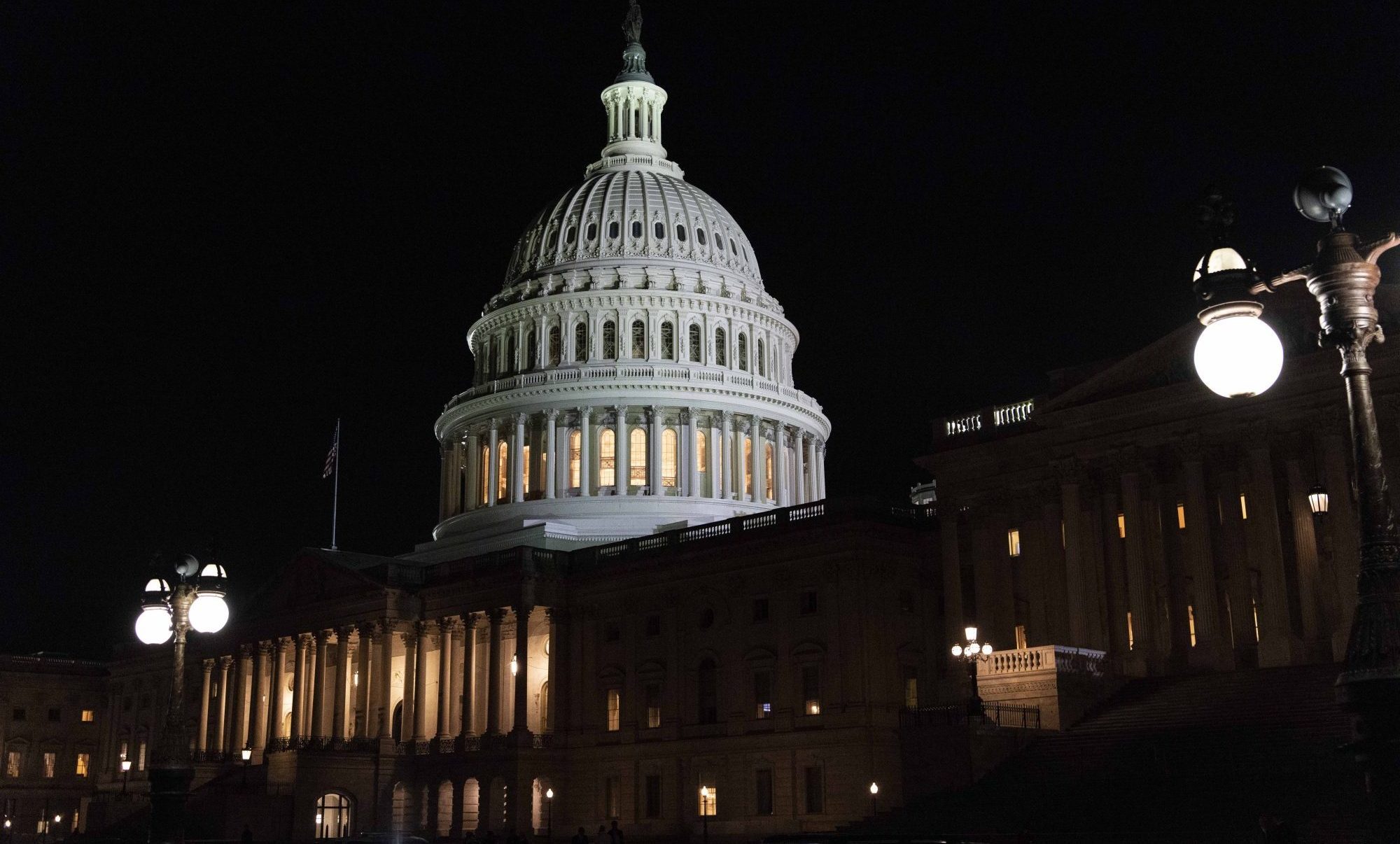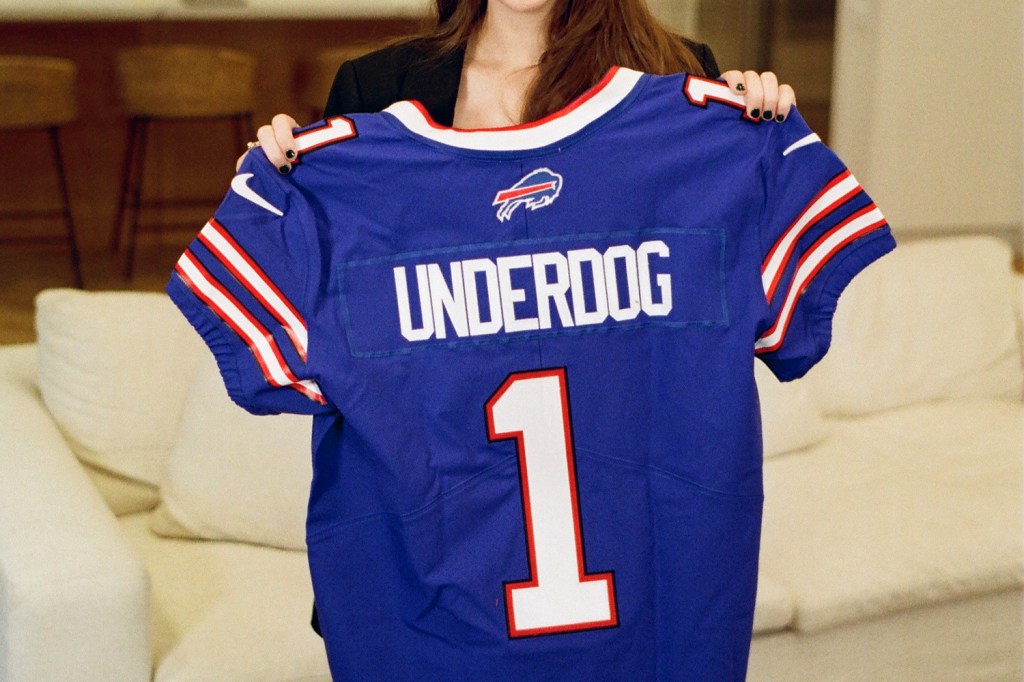College athletes have been living through a golden age since 2021. NCAA amateurism has begun to erode as players from the richest conferences rake in name, image, and likeness deals, leverage threats of transfers into six- or seven-figure checks, lounge in multimillion-dollar facilities, and enjoy more perks than many professionals. In coming months or years, they could win broadcast revenue sharing, collective bargaining power, and even employee status, thanks to ongoing federal court cases like House v. NCAA and campus unionization efforts.
But behind the scenes, the NCAA and Power 5 have coordinated a sophisticated campaign in Congress over the past five years to bring back amateurism for good. They want to not only halt future reforms, but also potentially reverse the gains already made.
Since 2019, the six entities have spent more than $15 million on some of the most powerful lobbying firms in Washington, D.C., and an undisclosed amount (likely in the millions) on well-connected public relations firms, public record and expert analysis show. Using some of the same high-powered lobbyists and PR professionals as Purdue Pharma and the Biden-Harris presidential campaign, they’ve manipulated the conversation on Capitol Hill, shaped media discussions to reflect their talking points, and influenced multiple legislative proposals.
Using these power brokers, they’re asking for three things: an antitrust exemption (free reign on dictating their own compensation rules), a law specifying that college athletes don’t count as employees, and the ability to preempt conflicting state laws. The campaign could halt the extensive push for athlete unionization and employee status as well as allow the NCAA to place new restrictions on existing reforms like NIL rights. Athletes could also lose any legal pathway to challenge amateurism in court in the future.
At the same time, most athletes don’t know that a debate over the future of amateurism is taking place at all, let alone in Congress—or that the debate could result in a loss of economic power, advocates and experts agree. Longtime athlete advocate Ramogi Huma describes the situation as “David vs. Goliath.” But in this analogy, David doesn’t even exist—there’s almost no formal opposition to the NCAA machine besides a few lone outside actors.
“Congress is a place where you can carve [certain] Americans out of equal rights,” says Huma, who played a major role in multiple pro-athletes rights court cases, as well as NIL rule changes, and has dealt with Congress for more than a decade. Congress can do that to college athletes, too, he says, if it agrees to do the NCAA and power conferences’ bidding.
In the early 1980s, Richard Ford was a walk-on Duke basketball player for one of coach Mike Krzyzewski’s first teams. He ultimately became a scholarship athlete and team captain, all while witnessing firsthand the NCAA’s chokehold on player compensation. After his playing days were over, he went into a career as an attorney and professor.
But he embarked on a new journey in 2021, when he began airing the podcast BigAmateurism monologues, demystifying the NCAA’s business model and efforts to preserve it. But the podcast was only the beginning. For months, he’s been working with Casey Floyd, chief compliance officer at NIL company Nocap Sports, on Did You Know Media, which publishes hundreds of pages of research about NCAA operations, public records, congressional hearing notes, lobbying activity, and more.
“This is a breathtaking lobbying campaign,” says Ford, who likens his research to studying for a PhD. The goal with the project, which launched in March, is “to get athletes engaged to understand enough about what’s happening so they can use their own voice.” (Much of the information in this story on the lobbyists themselves comes from their research.)
The NCAA has employed its own lobbyists in Washington since at least the 2000s, public lobbying disclosures show. But the modern lobbying efforts really began in ’14, when a federal judge found the NCAA was illegally withholding NIL earnings from athletes in the landmark federal court case, O’Bannon v. NCAA. That same year, it hired a powerful outside lobbying firm, Brownstein Hyatt Farber Schreck, LLP. Five years later, after California state legislators passed a law intending to legalize NIL deals, the NCAA launched an all-out, pro-amateurism assault, according to DYK Media’s research.

Since then, the NCAA has both in-house and K Street lobbyists on its payroll. In 2019, the NCAA spent $690,000 in total, according to public lobbying disclosures counted by DYK Media. The organization has increased its expenditures every year since, peaking at $900,000 in ’23. Overall, the governing body has spent around $7 million on both its in-house “Office of Government Relations” and Brownstein Hyatt between ’19 and ’23 alone.
The face of the NCAA’s in-house lobbying is former professional tennis player Dawn Buth, who has worked in the D.C.-based government relations office since 2018, according to her LinkedIn. A mainstay in Washington, she was recognized in ’23 as one of The Hill’s top corporate lobbyists, as well as one of “DC’s 500 Most Influential People,” according to Washingtonian magazine, which described her as “leverag[ing] her ties on Capitol Hill and in the sports world to advocate on behalf of the NCAA as it earns greater scrutiny for its treatment of student athletes.”
Buth’s office has also been “lobbying” the NCAA membership: One letter to administrators, published by DYK Media, listed the NCAA’s main talking points ahead of a March 29, 2023, congressional hearing and spoon-fed them a list of which participating lawmakers to contact to reiterate these points. The NCAA national office employees have sent multiple emails of this type, including just last month, according to Sports Business Journal. (An NCAA spokesperson declined to make Buth available for an interview with FOS.)
Meanwhile, the NCAA’s outside firm, Brownstein Hyatt, is the highest-grossing firm in Washington and has participated in some of the biggest lobbying industry campaigns. After pleading guilty to multiple felony counts, the opioid manufacturer Purdue Pharma likely looked to the firm for damage control, crisis communication, and influence to mitigate further penalties. Five of the six Brownstein Hyatt lobbyists working for Purdue Pharma have also worked at the NCAA, DYK Media found.
Brownstein Hyatt is also a quintessential example of the lobbying industry’s “revolving door,” where lawmakers and their employees go back and forth between Capitol Hill and K Street throughout their career. One particularly high-profile example: David Bernhardt worked at Brownstein Hyatt before being appointed by the Trump Administration as U.S. Secretary of the Interior and has since returned to the firm, according to his LinkedIn page.
The power conferences have the same agenda as the NCAA, but they have enlisted their own separate army of lobbyists from at least eight firms, according to DYK Media. The Big 12 and ACC began their lobbying campaigns in 2019; the other three joined the following year. The SEC and ACC each spent $2.47 million between ’19 and ’23, at least $1 million more than the Big 12, Pac-12, and Big Ten, respectively. (The Big Ten was the only league that spent less than $1 million in that time period.)
Since 2020, the SEC has employed Akin Gump, the second-highest-grossing firm behind Brownstein Hyatt, according to public records and DYK Media research. (While the Pac-12 does not employ Akin Gump for lobbying, the firm is representing the league in a National Labor Relations Board case over athlete employee status.) Multiple conferences employ Subject Matter, one of the 20 highest-grossing firms, and Marshall & Popp, well known for its ties to prominent Republican lawmakers, including Senate Minority Leader Mitch McConnell. Like Brownstein Hyatt, Marshall & Popp has represented high-powered pharmaceutical companies like Pfizer.
The NCAA and power conferences continued their usual spending patterns so far this year, according to lobbying disclosures reviewed by FOS, with the exception of the now two-member Pac-12, which has stopped spending altogether. In an interview this week, commissioner Teresa Gould confirmed the conference intends to continue to involve itself in these discussions regardless of lobbying spending.
The multipronged campaign raises the ethical question of whether educational nonprofits should spend millions to lobby for their own interests and, in turn, against the interests of the students they claim to serve. But it also raises a concrete legal question: Nonprofit organizations with the 501(c)(3) designation have limits on lobbying spending, according to the IRS. FOS found no direct evidence that the NCAA or conferences had violated any tax law. But it’s “absolutely reasonable” to say that the six organizations could be splitting the costs so as “not to raise an eyebrow” with tax authorities, FIU professor and nonprofit tax expert Erica Harris tells FOS.
Overall, higher education is a major player in the lobbying space, explains OpenSecrets research director Sarah Bryner, even though it won’t break any spending records. “Multiple offices, without me even asking, mentioned that the higher education community is the most powerful lobby in Congress,” says Huma, who has been meeting with lawmakers since the 2000s. “People think it’s Big Pharma or Big Oil—and it’s not. It’s higher education.”
The NCAA has been peddling its pro-amateurism doctrine “for decades and decades,” Huma says. “It can sink into the consciousness of America, and they do that really well.”
But in 2023, the governing body got a particularly impressive public relations upgrade in new president Charlie Baker. Renowned for his ability to elicit bipartisan support as a Republican governor of left-leaning Massachusetts, Baker has positioned himself as a moderate in the battle for the soul of college sports. During congressional hearings, he keeps a poker face through political grandstanding, answering questions politely even as his eyes glaze over, and exhibiting a calm, rational air as he asks lawmakers to understand the logic in his asks of Congress.
While multiple NCAA administrators and commissioners have rattled off their wish list for Congress publicly, no one is better at it than Baker. He’s used the phrase “elephant in the room” to describe the revenue that athletes are missing out on, and he has reminded lawmakers he’s encouraging schools to give them a cut. But he says the death of amateurism would hurt everyone, creating budget shortfalls that would impact Olympic sports and women’s sports (despite the myriad evidence to the contrary). Attorney Paul McDonald, who is fighting to get athletes employee status through a federal court case, often refers to these NCAA talking points as the NCAA’s “parade of horribles.”
To bolster their “common-sense” position, the NCAA is also focusing on what it has done to reform college sports. In January, Baker blasted an email to the membership introducing “Project DI,” a proposal suggesting some of the richest schools should be able to share revenue with their players. During men’s and women’s March Madness this year, an advertisement touted increased scholarship and health-care benefits, even though those perks resulted from lawsuits against the NCAA, not the organization’s goodwill.
The NCAA used this strategy in its statement to FOS: “The NCAA has made significant changes to increase benefits for student-athletes including new healthcare and academic protections that go into effect next year and while the NCAA will pursue all internal measures possible to confront the challenges facing college sports there are some issues the Association cannot tackle alone,” a spokesperson said. “To set national standards and to improve outcomes for student-athletes in the evolving landscape of college sports, the NCAA as well as student-athlete leaders from all three divisions are eager to partner with Congress to improve outcomes for all student-athletes.”

The governing body, like its conference counterparts, has also enlisted outside PR assistance throughout the years. Between 2015 and ’18, the NCAA paid more than $40 million to left-leaning D.C.-based PR firm Bully Pulpit Interactive (now Bully Pulpit International), according to tax documents compiled by DYK Media. The firm works with major clients, like Uber, McDonald’s, and the Biden-Harris president campaign, its website says. The NCAA’s tax returns reviewed by FOS have not listed payments to the firm since ’19, but the firm has worked with the NCAA as recently as this year: In January, Bully Pulpit partner Robert Gibbs moderated an NCAA convention event advising school administrators on their own lobbying efforts. Gibbs is no stranger to strategic public messaging. He served as former President Barack Obama’s White House press secretary from ’09 to ’11, and his specialty, per the NCAA, is “corporate reputation, executive communications, and crisis response.”
The messaging from conferences and the NCAA trickles down to the athletes, too, through the NCAA’s Student Athlete Advisory Committee. SAAC is supposed to be a way for current athletes to have a voice in the NCAA governance structure. But current and former Division I athletes told FOS that SAAC thrusts these views upon athletes during meetings and in group communications, and ostracizes those who question it. One glaring example: Last year, the NCAA sent pro-amateurism letters to federal lawmakers purportedly written and endorsed by the SAAC members in each division in support of the amateurism model. Current and former players said at the time that they misrepresented athletes’ beliefs.
The Power 5, meanwhile, has built its own PR machine.
The conferences have been strategizing together for several years, sending joint letters to Congress as early as 2020. But beginning in ’23, they got serious. They hired Firehouse Strategies, a D.C.-based PR firm founded in ’16 by former Marco Rubio presidential campaign strategists, to lead its messaging in Washington. The firm describes itself as “delivering targeted persuasion campaigns for a wide variety of corporate clients.” It sends emails to reporters with statements on the power conferences’ behalf in support of federal legislation that favors protecting amateurism, has helped provide national media platforms for commissioners, and specializes in grassroots campaigns. (It’s unclear how much the conferences are paying the firm, however, as tax records for ’23 are not yet available.)
Look no further to understand the extent of their campaign than jumbotrons during last year’s football conference championship games. The conferences advertised an organization called the Coalition for the Future of College Athletics, where fans were invited to send letters to Congress about protecting amateurism through a QR code on the screen. Click the blue button on its website to “support college sports,” and any fan can send their local representatives a message in support of the coalition’s goals, such as to “prohibit pay-for-play” and “preserve student status.”
Last year, Tony Petitti, Jim Phillips, Greg Sankey, and Brett Yormark—the commissioners of the new “Power 4”—took one of their many trips to Washington during football championship week. MEAC commissioner Sonja Stills, who was on Capitol Hill for a rare opportunity to advocate for HBCU interests, was surprised to run into them in the halls of Congress. “We walked out the elevator, and there they were,” Stills told FOS in December 2023. Later, the Power 4 commissioners, clad in suits and ties, sat for a joint interview with CNN. They talked extensively about NIL, lamenting the challenges facing an industry that was once much simpler (albeit less lucrative for players).
The commissioners don’t get meetings in D.C. and spots on CNN without the political clout that they’ve purchased. But it’s bought them far more than that—the multimillion-dollar lobbying and PR campaign has helped them monopolize official conversations during legislative hearings and influence the language of proposed bills.
Of the 12 congressional hearings since 2020, there has been only one Power 5 football or basketball player witness, according to DYK Media’s count—and when athletes do get chosen, they often come from SAAC. Getting an advocate is even tougher; College Football Players Association executive director Jason Stahl tells FOS he had to go through multiple rounds of vetting before his first appearance on a congressional panel. “Every [hearing] we put forward a list of good athlete advocates,” Huma says. “For whatever reasons the committees choose whoever they choose. It seems like it’s always loaded on the school side.”
Plenty of Republicans (and even a few Democrats) have slapped their name on favorable bill drafts that include at least a version of the NCAA’s requested antitrust exemption. In the process, some of the most left-leaning lawmakers on the NCAA issue, like senators Cory Booker (D., N.J.) and Richard Blumenthal (D., Conn.), have moved further to the right based on the bills they’ve recently introduced.
While the NCAA and commissioners have purchased power, the athletes’ situation could not be more different. Very few are informed on the amateurism debate, and those emboldened to go against the NCAA have a major disadvantage without lobbyists of their own or a professional platform. Former UMass tennis player Brittany Collens, who has been a panelist at congressional events and been consulted by federal lawmakers on NIL legislation, tells FOS that even she has had trouble keeping in contact because the legislative aides serving as her liaison to lawmakers are constantly taking new jobs. Athlete advocates, like Stahl and Huma, are few and far between. (Reports have even suggested a settlement in the House case could require athlete plaintiffs to join the NCAA efforts in Congress.)
“The athletes’ rights movement is very disorganized,” Ford says. “You have these self-contained groups of insurgents that sort of make a play here and there. But that disorganization is a real liability.”
So far, however, none of these bills have reached a vote. Congresspeople on both sides of the aisle are “holding the line” against the lobbying machine, Huma says. “I would give credit to many of the lawmakers. I think that this is an issue where lawmakers genuinely believe that college athletes should not be carved out of equal rights.”
But that could change.
The NCAA and power conferences are deep in settlement talks for the House v. NCAA, which could force schools to share television revenue with athletes. That settlement is being presented as the pinnacle of the athletes’ golden age. But the NCAA plans to use it to end this era, in the hopes that Congress will see the goodwill in the settlement and then pass a law to stop them from having to make more radical changes. Lawmakers told ESPN this week that a settlement might not increase the momentum—but that’s notably only for this Congress. Add in the potential for Republicans to gain control of the Senate and the White House after the 2024 election, and suddenly Congress could be more amenable to giving the NCAA its power back, multiple experts agree.
So Goliath isn’t in a hurry. Ford says the lobbyists are “waiting for just the right time and the right circumstances to cash in on all of the work that they’ve done.”







![[Subscription Customers Only] Jun 15, 2025; Seattle, Washington, USA; Botafogo owner John Textor inside the stadium before the match during a group stage match of the 2025 FIFA Club World Cup at Lumen Field.](https://frontofficesports.com/wp-content/uploads/2026/02/USATSI_26465842_168416386_lowres-scaled.jpg?quality=100&w=1024)
![[Subscription Customers Only] Jul 13, 2025; East Rutherford, New Jersey, USA; Chelsea FC midfielder Cole Palmer (10) celebrates winning the final of the 2025 FIFA Club World Cup at MetLife Stadium](https://frontofficesports.com/wp-content/uploads/2026/02/USATSI_26636703-scaled-e1770932227605.jpg?quality=100&w=1024)









